AWM41 1020 - [Nurses Narratives] Staff Nurse Lily M Payne - Part 2
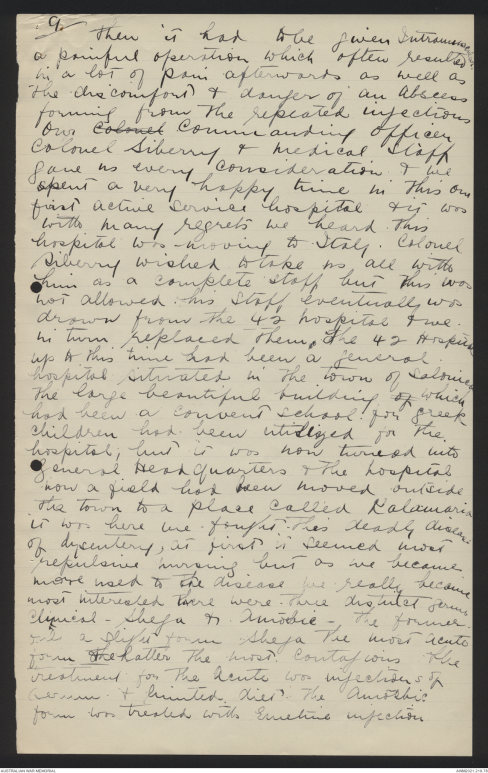
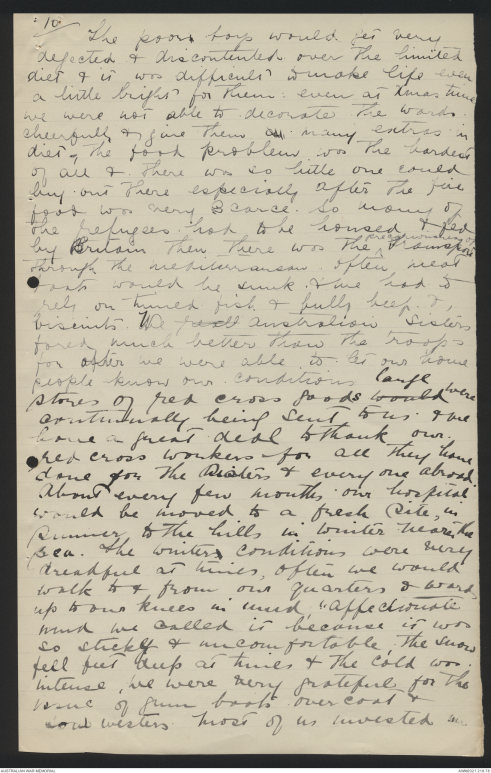
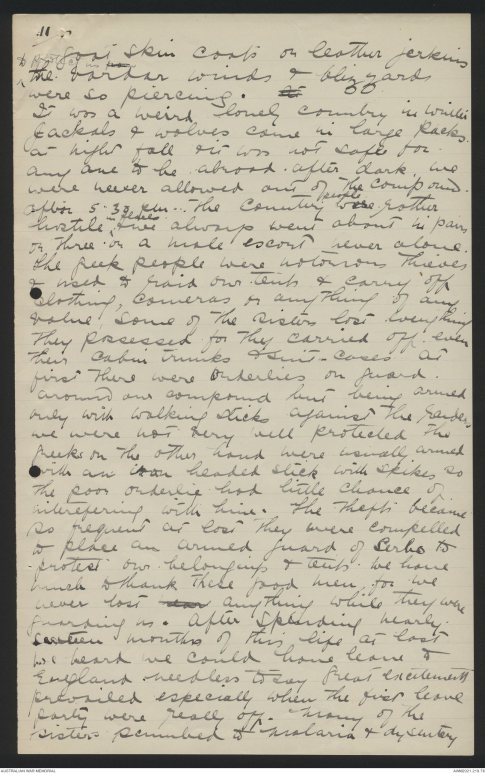
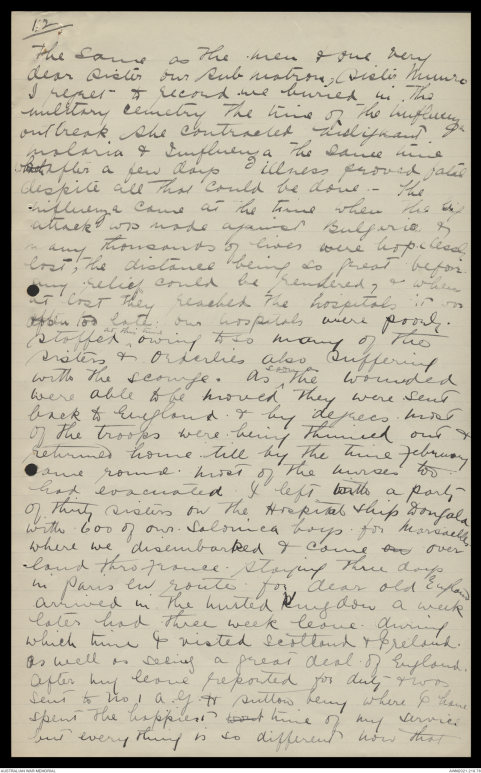
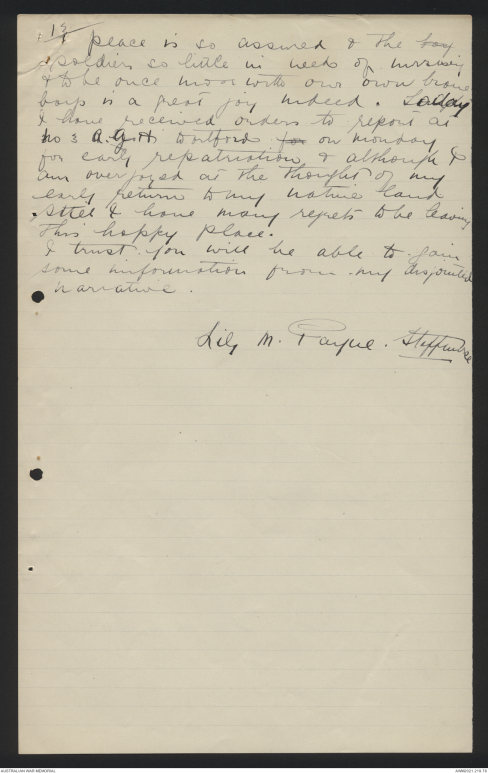
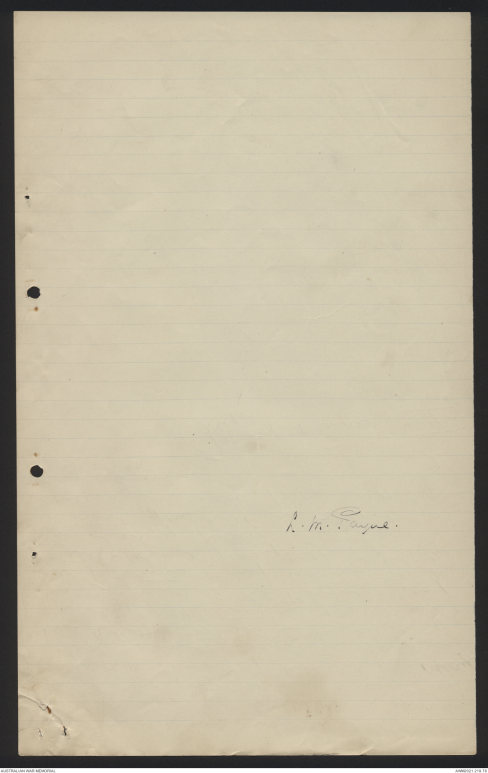
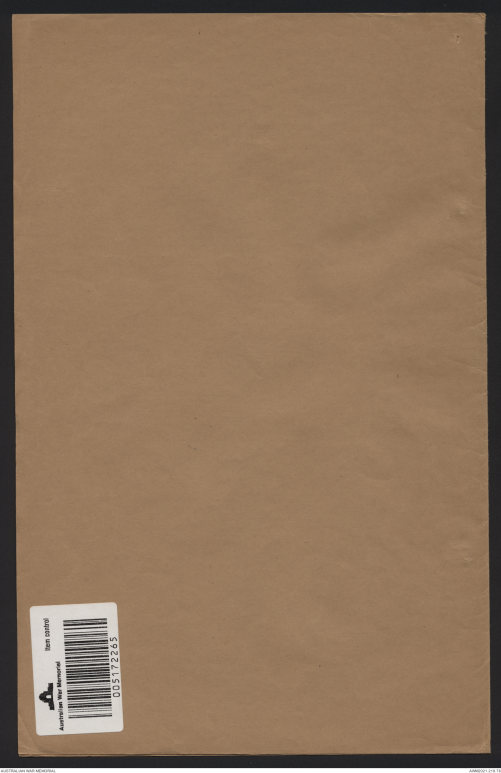
9.
Then it had to be given Intramuscular
a painful operation which often resulted
in a lot of pain afterwards as well as
the discomfort & danger of an abscess
forming from the repeated injections
Our Colonel Commanding officer
Colonel Siberry & medical staff
gave us every consideration & we
spent a very happy time in this our
first active service hospital & it was
with many regrets we heard this
hospital was moving to Italy. Colonel
Siberry wished to take us all with
him as a complete staff but this was
not allowed. his Staff eventually was
drawn from the 42 hospital & we
in turn replaced them. The 42 Hospitals
up to this time had been a general
hospital situated in the town of Salonica
The large beautiful building of which
had been a convent school for Greek
children had been utilized for the
hospital, but it was now turned into
General Headquarters & the hospital
now a field had been moved outside
the town to a place called Kalamaria
it was here we fought this deadly disease
of dysentery, at first it seemed most
repulsive nursing but as we became
more used to the disease we really became
most interested there were three distinct germs
Clinical - Shega & Amoebic the former
was a slight form Shega the most acute
form & the latter the most contagious The
treatment for the Acute was injections of
serum & limited diet The Amoebic
form was treated with Emetine injection
10.
The poor boys would get very
dejected & discontented over the limited
diet & it was difficult to make life even
a little bright for them. even at Xmas time
we were not able to decorate the wards
cheerfully & give them as many extras in
diet, the food problem was the hardest
of all & there was so little one could
buy out there especially after the fire
food was very scarce. So many of
the refugees had to be housed & fed
by Britain Then there was the ∧ provisioning of Transport
through the mediterranean. often meat
boats would be sunk & we had to
rely on tinned fish & bully beef &
biscuits. We reall Australian Sisters
fared much better than the troops
for after we were able to let our home
people know our conditions large
stores of red cross goods would were
continually being sent to us & we
have a great deal to thank our
red cross workers for all they have
done for the Sisters & every one abroad.
About every few months our hospital
would be moved to a fresh site, in
summer to the hills in winter nearer the
sea. The winters conditions were very
dreadful at times, often we would
walk to & from our quarters & wards
up to our knees in mud, "affectionate
mud we called is because is was
so sticky & uncomfortable, The snow
fell feet deep at times & the cold was
intense, we were very grateful for the
issue of gum boots overcoat &
sow westers Most of us invested in
11
goat skin coats or leather jerkins
^to protect us from The [[vardar ?]]winds & blizzards
were so piercing. At
It was a weird lonely country in winter.
Jackals & wolves came in large packs.
at night fall & it was not safe for
any one to be abroad. after dark, we
were never allowed out of the compound.
After 5.30 pm. the country people were rather
hostile ^in places & we always went about in pairs
or three or a male escort never alone.
The Greek people were notorious thieves
& used to raid our tents & carry off
clothing, cameras or anything of any
value, some of the Sisters lost everything
they possessed for they carried off. even
their cabin trunks & suit-cases At
first there were Orderlies on guard.
around the compound but being armed
only with walking sticks against the raiders
we were not very well protected The
Greeks on the other hand were usually armed
with an iron headed stick with spikes so
the poor orderlie had little chance of
interefering with him. The thefts became
so frequent at last they were compelled
to place an armed guard of Serbs to
protect our belongings & tents. We have
much to thank these good men for we
never lost our anything while they were
guarding us. After spending nearly
seventeen months of this life at last
we heard we could have leave to
England needless to say great excitement
prevailed especially when the first leave
party were really off. Many of the
sisters sucumbed to malaria & dysentery
12
The same as the men & one very
dear Sister our Sub matron, Sister Munro
I regret to record we buried in the
military cemetry The time of the influenza
outbreak she contracted malignant
malaria & Influenza the same time
but after a few days illness proved fatal
despite all that could be done - The
influenza came at the time when the big
attack was made against Bulgaria &
many thousands of lives were hopelessly
lost, the distance being so great before
any relief could be rendered, as when
at last they reached the hospitals it was
often too late. our hospitals were poorly
staffed ∧ at this time owing to so many of the
Sisters & Orderlies also suffering
with the scourge. As ∧ soon as the wounded
were able to be moved they were sent
back to England & by degrees most
of the troops were being thinned out &
returned home till by the time February
came round most of the nurses too
had evacuated I left with a party
of thirty sisters on the Hospital ship Dongola
with 600 of our Salonica boys for Marsaelles
where we disembarked & came on overland
thro France. staying three days
in Paris en route for dear old England
Arrived in the United Kingdom a week
later had three week leave during
which time I visited Scotland & Ireland
as well as seeing a great deal of England.
After my leave reported for duty & was
sent to No 1 A.G.H. Sutton Veny where I have
spent the happiest wou time of my service
but everything is so different now that
13
peace is so assured & the boy
soldiers so little in need of nursing
& to be once more with our own brave
boys is a great joy indeed. Today
I have received orders to report at
No 3 A.G.H. Dartford for on Monday
for early repatriation & although I
am overjoyed at the thought of my
early return to my native land
still I have many regrets to be leaving
this happy place.
I trust you will be able to gain
some information from my disjointed
narrative.
Lily M. Payne. Staff nurse
L. M. Payne.
Item control
Australian War Memorial
005172265
 Sam scott
Sam scottThis transcription item is now locked to you for editing. To release the lock either Save your changes or Cancel.
This lock will be automatically released after 60 minutes of inactivity.